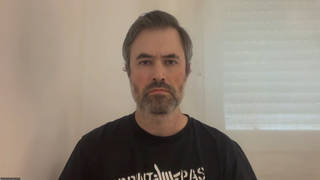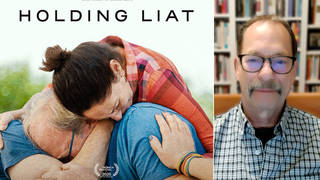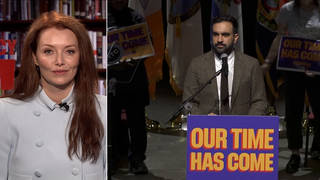
Guests
- Vanessa RothAcademy Award-winning documentary filmmaker. Her latest film is called American Teacher.
- Jamie Fidlerfirst grade public school teacher in Brooklyn, New York. She is featured in the documentary film American Teacher.
Opening today, the new documentary “American Teacher” follows the lives of four teachers who struggle to remain in a profession they love, despite the heavy toll exacted on their lives by the grueling hours and low salaries. The documentary is a rebuttal of sorts to pundits who portray public school educators as cushioned recipients of taxpayer-supported benefits, extended summer vacations and low accountability. We speak with the film’s Academy Award-winning director, Vanessa Roth, and with Brooklyn first grade public school teacher, Jamie Fidler, who is featured in the film. [includes rush transcript]
Transcript
JUAN GONZALEZ: We turn now to education news. A new documentary on American public school teachers opens today. American Teacher follow the lives of four teachers who struggle to remain in a profession they love, despite the heavy toll exacted on their lives by grueling hours and low pay. The documentary is a rebuttal of sorts to pundits who portray teachers as cushioned recipients of public benefits, extended summer vacations and low accountability. This is a portion of the film’s trailer.
NEIL CAVUTO: They are our public servants, but why do I get the feeling that a lot of them are more in it for serving themselves?
UNIDENTIFIED TEACHER: I know that I’m a teacher, in every cell of my body.
JONATHAN DEARMAN: We can achieve brilliance, and we will achieve brilliance, and It’s going to be a lot of work, but it’s completely doable for everybody in this classroom.
NEIL CAVUTO: If they’re here to serve our kids, why does it seem they’re only serving us a big old bill?
JAMIE FIDLER: I had no idea how much money I was going to have to spend out of my own pocket, because I didn’t get anything, really.
RHENA JASEY: When I started telling my friends that I wanted to go into education, everyone immediately said, “You went to Harvard. You should be a doctor or a lawyer. You should make money.”
UNIDENTIFIED TEACHER: Everyone has heard that old axiom that those who can, do, and those who can’t, teach. The proponents of that axiom have never stood in front of a classroom.
JAMIE FIDLER: Good morning, first grade.
FIRST GRADERS: Good morning, Ms. Jamie.
UNIDENTIFIED TEACHER: Teachers make thousands of decisions a day, and they don’t do it about an abstract idea. They do it about the life of a child. You can’t imagine anything harder.
MATT DAMON: Given the low pay and long hours, teachers burn out at a rate unparalleled in almost any other field.
UNIDENTIFIED TEACHER: I feel like I give everything I have, but it’s never enough.
ERIK BENNER As the man, you’re supposed to be the provider. When you can’t provide for your family, you feel like a loser.
ADMINISTRATOR: We would like them to be getting to know their students and their parents, making sure that they’re going to provide the great instruction that we’ve been talking about. Instead, they’re off to 7-11. Almost every teacher I know has a second job.
UNIDENTIFIED TEACHER: Nobody would question a doctor being paid or a lawyer being paid, and I think the skill set required is at least as complex, if not more complex.
MATT DAMON: In America, 46 percent of teachers quit before their fifth year.
UNIDENTIFIED: My son just graduated from college this year, and he’s making way more selling cell phones for Verizon than he ever could as a teacher. Something is wrong when selling cell phones is more important to our society than being a teacher.
MATT DAMON: There are currently 3.2 million public school teachers in the United States. In the next 10 years, 1.8 million of them will be eligible for retirement. Who will replace them?
STUDENT: Having a teacher that’s—that you can trust, you know, that will change lives.
JUAN GONZALEZ: That’s an excerpt from the trailer from the film American Teacher, which opens today. Although many teachers have welcomed the documentary’s sympathetic portrayal of their profession, some have voiced concern about its corporate funders and how they may have influenced the film’s decision to portray charter schools favorably and not once mention the teachers’ unions.
Democracy Now! spoke with Harlem public school teacher Brian Jones shortly after he attended an advanced screening of the film. Here’s what he had to say.
BRIAN JONES: Here, the filmmakers seem to have made a very clear choice. In fact, I got to speak to one of the filmmakers after the film, who told me that they consciously chose not to mention, even one time in the film, the word “union,” for example. Here’s a film that’s supposed to be about the need to raise teachers’ salaries, and yet the organization and organizations that have probably done more than anyone else to raise teachers’ salaries can’t be mentioned, because of who they will offend.
JUAN GONZALEZ: That was Harlem public school teacher Brian Jones.
Well, for more, we’re joined from Boston by the director of American Teacher, Vanessa Roth. She’s an Academy Award-winning documentary filmmaker who worked on her latest film with Dave Eggers and Nínive Clements Calegari. We’re also joined here in the studio by Jamie Fidler. She’s a first grade public school teacher in Brooklyn who was featured in American Teacher. She’s been teaching for the past 11 years.
We welcome you both to Democracy Now!, and I’d like to begin with Vanessa. Why did you make this film, and what were you hoping to accomplish through it?
VANESSA ROTH: Good morning. Yeah, I’d love to get to that, but I first—the introduction saying that the film was made by corporate sponsors, I need to clarify that that’s not true. That’s misinformation. The film actually wasn’t funded by any corporate sponsors. We had donors that were individuals. We had very small donations from foundations. The film, actually, it was very difficult to get the film funded, and none of the producers and myself, we haven’t been paid a cent for even making the film, haven’t even had expenses paid back. So I want to clarify, this is not a corporately made film. We have—we now have—Microsoft Partners in Learning is doing an outreach program for us to help us get the film out to community screenings, so anybody in the country can host a screening of the film, but they did not fund the film in any way and were not involved in the film until the film was completely finished, and there again, just helping with community screenings so that everybody can see the film.
And then, the other piece that you played about the teacher saying that we somehow weren’t allowed to use anything about the unions, that’s also not true. We could have gone into union discussion, and we’re all very aware of the climate right now in education, but we made a choice that this film was to follow the lives of teachers. And we welcome the discussions. We welcome the discussions by the unions. We welcome discussions by charters. But the film wasn’t about the system. The film was about teachers’ lives and the day-to-day of the responsibilities that they have and the importance of their job and the need to value them in a different way in our culture. So, sorry to start with that, but just—it wasn’t accurate.
JUAN GONZALEZ: OK, that’s—no, that’s fine, and I appreciate the clarifications, although on the second part, I think Brian Jones was saying that there was a—not that you weren’t allowed, but there was a choice made not to mention unions in the film.
VANESSA ROTH: Right.
JUAN GONZALEZ: But if you could tell us why you decided to make the film and what you were hoping to accomplish.
VANESSA ROTH: Yeah, so, Dave Eggers and Nínive Calegari had written a book called Teachers Have It Easy: [The Big Sacrifices and Small Salaries] of America’s Teachers, and they had come to me to see if I would expand on the book and make the film. And for me, it was an important film to make, because the friends that I have that are teachers, my family who teach, and my kids’ teachers, I see them work so hard every day. I see the debate that’s going on in education. And to me, the most important thing that I notice is the teacher that’s in front of that classroom, and I felt that there hadn’t been—there hadn’t been a film that really just looked into the lives of teachers, that really did put the policy to the side and look at what the truth of teachers’ lives are and why they’re quitting as quickly as they’re quitting and how come we’re having such a hard time retaining them. I felt like it would be important for us to really just get more intimate into those teachers’ lives to understand those bigger policy issues.
JUAN GONZALEZ: Well, we’re also joined here by Jamie Fidler, who was featured in the film, a first grade teacher in Brooklyn at a public school in Brooklyn. Tell us a little bit about your teaching experience. You’ve been—is it 11 or 12 years you’ve been teaching?
JAMIE FIDLER: Going—I’m participating in my 12th year right now.
JUAN GONZALEZ: And how you ended up being in the film?
JAMIE FIDLER: Through a friend of a friend of a friend, it all sort of happened, and I had no idea at the time when I accepted the offer to be in the film—when I met Vanessa, I had no idea what path this would take me on. But I just went with it. It seemed like an interesting project.
JUAN GONZALEZ: And your experiences as a public school teacher, with, obviously, teachers being so much in the news in a negative way in recent years, in terms of, like, school systems demanding greater accountability, longer hours, now with many—obviously, with the recession, many teachers being laid off across the country?
JAMIE FIDLER: Yeah. I have—since the film has been made, which was three years ago when they filmed me, I have gotten very involved in more grassroots education movements. And I have fought a lot against teacher layoffs in the spring, when New York City teachers were going to be laid off. I’ve gotten very involved in that end of things. I’ve been in two different schools, and I’m very aware of the fact that I am in a lovely, lovely school at this point in Brooklyn. And I’m—my colleagues and I are very fortunate to have a principal who’s actually been a teacher, which is very rare in this day and age, someone who actually was even a special education teacher rather than someone from the Principals Academy. So, our mentor, our leader, is actually someone with a vision in education, and that’s been an amazing thing. I worked very hard to get into my school, and I knew what I was doing when I got there. And I haven’t left.
JUAN GONZALEZ: Well, I want to turn to a clip from American Teacher. In this clip, a Texas history teacher, Erik Benner, explains how he worked at a second job at Circuit City just to make ends meet.
ERIK BENNER: Well, every once in a while, you know, run into somebody you know out on the sales floor. And, “I thought you were a teacher.” You know, one of those things, like, “What happened? You get fired?” And, “Why are you at Circuit City?” You know, and then, you know, you kind of have to try to explain yourself and, you know, and say, “Well, I’m doing this for extra money,” you know, and that type of thing. And sometimes it could be a little embarrassing if it was somebody you knew, and they’re looking kind of down on you, and, you know, you felt like you had to justify yourself.
JUAN GONZALEZ: Vanessa Roth, tell us Erik Benner’s story and these kinds of stories that you feel the general American public doesn’t understand about what teachers are confronting today.
VANESSA ROTH: Yeah, I think there’s a little bit of a misconception about the life of a teacher, and one of those misconceptions is the hours and the idea that they have summers off. Erik is someone who was actually part of the book, Teachers Have It Easy. He works—he works actually three jobs. He works at school. He also coaches. And then he also worked, when we were filming, at Circuit City. He works there—he drives a forklift. And so, Erik is passionate about teaching. He’s never going to leave teaching. He feels that this is just what he has to do to make ends meet. It is what he has to do to make ends meet. But he’s not going to leave teaching because of it, which also, I think, shows that teachers who are great teachers aren’t motivated by the money. They’re motivated by wanting to teach. For us to give them a livable wage is something that I think that we need to do as a culture, as a society, in order to make sure those great teachers can just focus on teaching and not focus on the idea that after working all day at school with their students and investing everything they have into their life as a teacher, have to go drive a forklift at Circuit City to be able to feed their family. And so, Erik’s story in the film is about his juggling these different jobs, trying to manage keeping up with his teaching, but also the effect that that has had on his family and his own personal life. So, in the film, we watch—we watch him struggling with being able to do that.
JUAN GONZALEZ: Jamie, I want to turn to another clip from the film, in which you explain why you returned to your classroom just six weeks after delivering your baby.
JAMIE FIDLER: When someone says, like, “I can’t believe you’re back yet. Oh, my god! Are you crazy? How are” — you know, or even just whatever, “I don’t know how you came back so quickly.” Well, what am I supposed to do? You know? It’s not like we have rich parents, or, you know, it’s not—what am I supposed to do? So, you know, I’m not taking care of myself right now. I mean, that’s what’s—you know, that’s the really hard part. And I think that that’s the case for all new moms. You know, it’s really hard to take care of yourself. Now I’m up with her at 1:30 and 3:30 and then getting up and being with five-year-olds who need your undivided attention all day. It’s a lot. And I’m tired. So, yeah.
JUAN GONZALEZ: Jamie, the irony of a public school system that always says it’s about the children, but yet, when its own employees have children, it’s—they’ve got to get back to work as soon as possible, because they don’t have much time in terms of maternity leave.
JAMIE FIDLER: Right, so we had to be back—when you have a baby, you’re back six weeks from the day you give birth. And you’re paying, essentially, for your own maternity leave. So I had to use my own sick days. And just this year, I finally got back to positive days. So, even—even before that, I was negative, negative, negative, paying myself back for my six-week maternity leave. It’s terrible. It’s a terrible system, and I think it makes an assumption that—basically that women are not the primary breadwinners and that women will just take the—you know, stop working and take care of their children and stay home. And I think in this economy and in this day and age, that’s a really big misconception.
JUAN GONZALEZ: Well, Vanessa Roth, in the film, you speak to Zeke Vanderhoek of the Equity Project Charter Schools. I want to go to a clip where Zeke explains the school’s vision.
ZEKE VANDERHOEK: So the premise behind the school is, let’s bring the best teachers to the students and schools who need them the most. I’ve seen that when you put teachers who are—who have amazing content knowledge, who are great pedagogues, and who love kids, in a room, you can do amazing things. All the teachers of the school will make a base salary starting at $125,000. That’s completely funded by the public funds. And that was a deliberate decision, so that other schools can say to themselves, legitimately, we can do this, too. If we want to reallocate our funds, we can.
JUAN GONZALEZ: Yes, I’d like to ask Vanessa Roth, on this—on this experimental project at his school where teachers are paid over $100,000 a year for larger classes, your sense of whether this film is—or that school is a model that could be replicated anywhere else in the country?
VANESSA ROTH: Well, I think what Zeke did that’s very interesting to look at—and different districts around the country are looking at this model—is how to reallocate funds that are given to a school and within a district. And I don’t think that that’s just only charter schools that are able to look at that. I think that public schools can look at that, too. And so, as a model and as being progressive and just trying to think of new ways to make sure that the school is getting the best teachers and retaining those best teachers, I think Zeke is very progressive and interesting in that way.
And I think, you know, it’s a test. They’re going to see if that works. At that school, those teachers take on, you know, officially, more responsibilities that teachers in public schools take on anyway. But in Zeke’s school, they have rules that they mentor each other, and they do have hours that are—that they understand that they’re going to be at school long, long hours and work the full year. And so, their salary, though—again, what I think is interesting that we need to look at is that their salary is coming from the same, like Zeke said, the same public funds as any public school, and it’s just the way that that money is being allocated. And putting more towards the teachers is something that, for myself, was interesting to look at.
JUAN GONZALEZ: And we just have a few seconds, but one of the things that’s never mentioned in your film, in addition to the question of the role of unions, is the role of testing and the big emphasis, now, so many local states and governments, on testing in schools, high-stakes testing.
VANESSA ROTH: Right. And you’re right, and we don’t go into testing, because we—again, we’re not making a—we weren’t looking to make a film that was divisive in terms of bringing—there are lots of things the film couldn’t do. We weren’t going to do a complete policy film that was getting into issues that are very complex and very difficult to come to an answer in the course of a film, which is merit pay, which is the union issues—not that we don’t know all about them, and that we’re very aware and very willing to have the discussions and conversations. But you’re right, the film doesn’t go into testing. There needs to be discussion. There needs to be things challenged. That’s why, again, we hope the film is shown in communities across the country, so that these discussions can take place among community members, teachers, families and policy makers, and make some new, good decisions about how we value teachers better.
JUAN GONZALEZ: OK, well, I want to thank you both for being with us, Jamie Fidler, a Brooklyn public school teacher who was in the film, Vanessa Roth, Academy Award-winning filmmaker and the director of the new film, it opens today, American Teacher.












Media Options